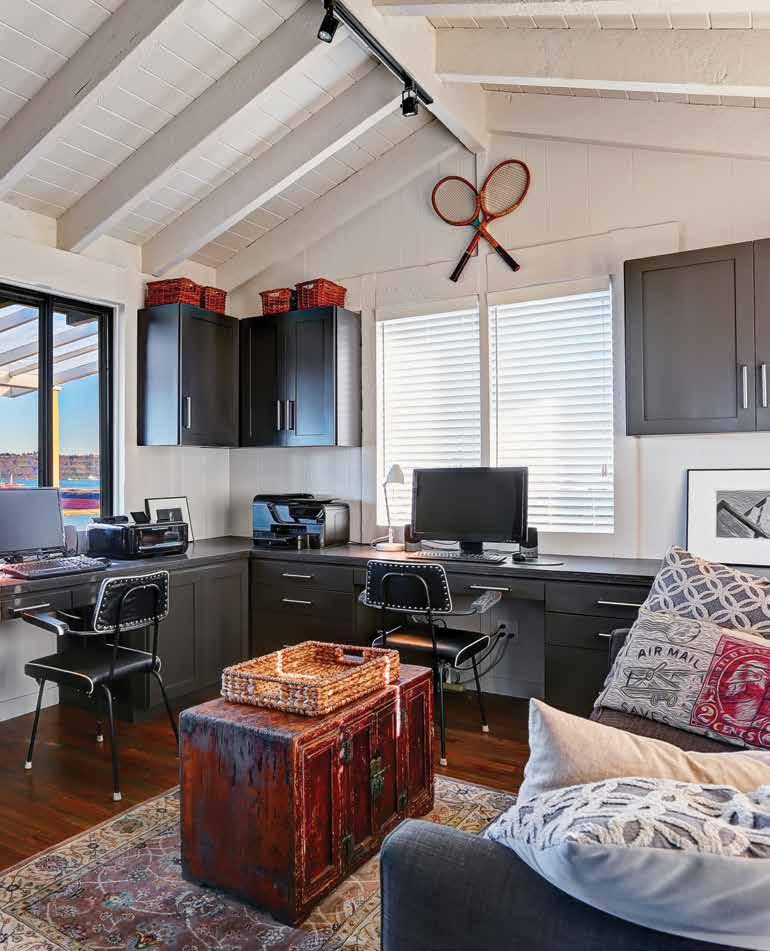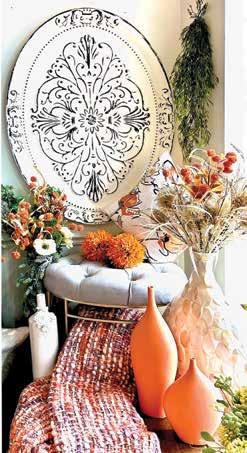
2 minute read
Reimagining Your REMOTE WORKSPACE
WITH REMOTE AND HYBRID work schedules here to stay for many Americans, it’s important to have a space dedicated to comfort and productivity. The initial transition to remote work may have involved setting up an impromptu workstation at the dining room table but creating a long-term, functional home office can be one of the first steps to increasing efficiency, focus and productivity.
Whether your work area is a spacious room, small den or desk in a quiet spot in the house, these ideas can help you create a space where you enjoy working.

Select the Perfect Location
While some remote workers have a spare bedroom or den they can dedicate as a home office, others may need to create a multiuse area in which office space occupies another room, such as the dining room, family room or basement. If you have several options for your workspace, consider how lighting and sound may impact your ability to focus.
For example, positioning your desk near a window can help increase your mood and reduce boredom. Similarly, if possible, choose a location where noise from other family members moving around or traffic outside will be less of a distraction. Earplugs or background noise can help drown out sounds if you’re restricted to a specific location in your home.
Keep Color in Mind
Colors can influence productivity and mood, so it’s important to consider them when designing or updating your workspace. Avoid white, which can lead to boredom, and instead choose a color scheme that can make a positive impact. Warm colors like red or orange can increase energy; blues are relaxing and can help keep blood pressure down; and green can help reduce stress.
An on-trend option like the Granny Chic Home Office from Wellborn Cabinet, Inc., can be set up in nearly any area of the home to create a stylish workspace. Featuring Premier Series cabinets with Napa doors in an olive finish and satin nickel hardware, this desk and hutch also includes base and crown moulding to help set it apart as a space devoted to productivity. Plus, accessories like a wastebasket pullout, drawer inserts and dividers, and tiered organizers can make organization easy.
Choose a Desk and Chair
Start by measuring your space to see how large of a desk you can accommodate then decide between a traditional desk or trendy adjustable-height version, which can allow you to sit and stand throughout the workday and has been shown to provide health benefits in addition to increasing work performance. An ergonomic chair with a padded seat and armrests is also a must-have to provide lumbar support and increase comfort while seated.
Find Storage Solutions
Storage is one of the most critical aspects when designing your home office. To avoid clutter and keep documents and other items organized, consider options such as built-in cabinets and shelving, base cabinets with desk file drawers, utility cabinets and wall bookcases. You can even customize your cabinets and choose from a wide selection of styles including traditional, transitional, casual, formal, contemporary or eclectic with options from Wellborn Cabinet.
Add Plants and Decor
Office plants provide numerous benefits, including improving air quality and increasing productivity. In fact, a study published in the “Journal of Environmental Horticulture” found productivity increased 12% when workers performed a task on a computer in a room with plants compared to those who performed the task in the same room without plants. Low-maintenance species such as orchids and succulents also produce a pleasant aroma and earthy atmosphere to decrease stress.
In addition, consider your space’s decorations if you will be conducting video calls. If your home office doesn’t have much natural light, place a light source behind the camera. While the background for your calls should be relatively neutral, a mural or art on the walls or shelves can complement your professionalism and add a creative touch to your space. Find more home office inspiration at Wellborn.com. n











